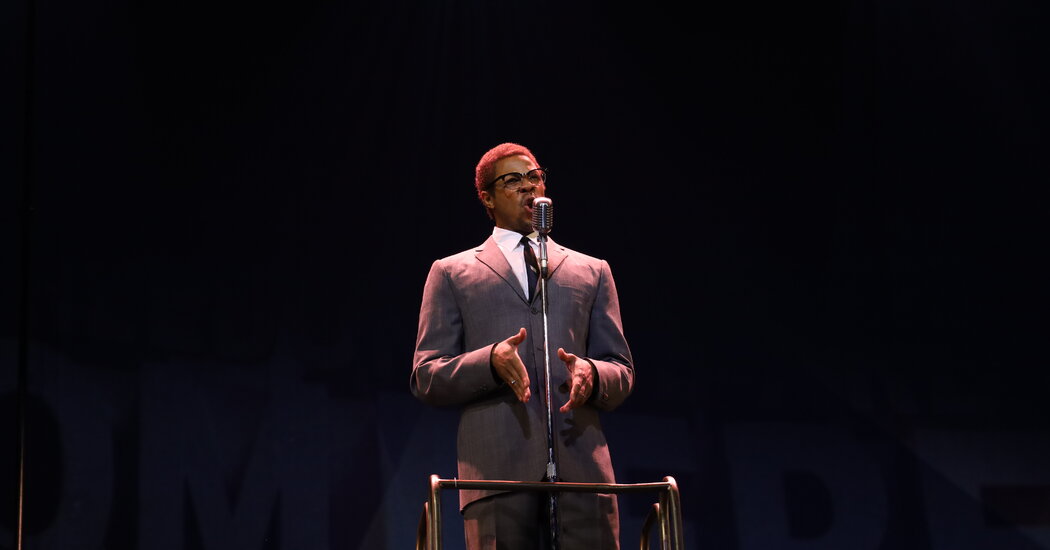
DETROIT — “When a man is lost,” sings Betty Shabazz, Malcolm X’s wife, “does the sky bleed for him, or does the sunset ignore his tears?”
The start of a smoldering aria, these words may be the most poetic and poignant in Anthony Davis’s opera “X: The Life and Times of Malcolm X.” Especially poignant because, for several decades, “X,” too, has been ignored.
The work, with a libretto by Thulani Davis, the composer’s cousin, from a story by his brother, Christopher Davis, premiered in the mid-1980s, first in Philadelphia and, officially, at New York City Opera. And then … largely silence.
For the past 36 years, it has been more talked about than heard. (An excellent studio recording from 1992 is now out of print.) And it was obvious, at the opening of a new production on Saturday at the Detroit Opera House, what “X” gains from being taken in live: Its stretches of incantation turn into something like a sacred rite.
In these passages, over carpets of complex, repeating rhythms in the orchestra, the ensemble chants short lines — “Africa for Africans,” “Betrayal is on his lips,” “Freedom, justice, equality” — again and again, building and overlapping. The opera is at its best in these long swaths of music poised between churning intensity and stillness. Without copying the prayer practices of Malcolm’s Muslim faith, the work evokes them.
Bringing “X” back to the stage is a coup for Detroit Opera, which has recently rebranded itself after 50 years as Michigan Opera Theater, inaugurating a new era under the artistic leadership of Yuval Sharon.
Sharon came to prominence as the founder of the experimental Los Angeles company the Industry, and he is swiftly bringing ambitious, inventive programming to Detroit, like a “Götterdämmerung” in a parking garage and a “La Bohème” whose four acts are played in reverse. The field is noticing what he’s up to: As part of a widespread effort to belatedly present more works by Black composers and librettists, this “X” will travel to the Metropolitan Opera (in fall 2023), Lyric Opera of Chicago, Opera Omaha and Seattle Opera.
In biopic style, the libretto sketches an outline of a short but eventful life: the murder of Malcolm’s father when Malcolm is a boy in Lansing, Mich.; his mother’s mental breakdown; his move to live with his half sister in Boston, where he falls in with a fast crowd and ends up in prison; his jailhouse conversion to the teachings of Elijah Muhammad and the Nation of Islam; the success of his Black nationalist ministry; his rift with Muhammad over tactics; his pilgrimage to Mecca; and the glimmers of a more universalist ideology of peace and racial unity, which he barely gets a chance to expound before his assassination in 1965, at just 39.
All this is conveyed in the heightened register of opera. Even the dialogue is pithy and exalted: “I come from a desert of pain and remorse.” The music is varied and resourceful; Davis won a Pulitzer Prize in 2020 for his most recent opera, “The Central Park Five,” but “X” is a deeper score.
It begins in a mournful, noirish mood, the moments of anxiety flirting with blues and subtle swing. Guided sensitively by the conductor Kazem Abdullah, the music goes on to swerve from punchy modernism to lyrical lushness, from peaceful worship to nervous energy and stentorian forcefulness.
An essay in the program describes how Davis’s original contract specified that “the word ‘jazz’ should not be used in any connection with this piece,” though an innovation here was to embed an improvising ensemble within a traditional orchestra. This works smoothly, as when a saxophone aptly depicts Malcolm’s new life in big-city Boston, or when a wailing, longing trumpet accompanies prayer in Mecca. The prisoners’ choral dirge is heated by squeals of brass, smoking underneath; along with Betty’s enigmatically tender aria, this is the most intriguing music of the opera.
The new production, directed by Robert O’Hara (“Slave Play”), has a unit set, by Clint Ramos, that evokes the partly ruined Audubon Ballroom in Harlem, where Malcolm was killed. (The mountain pass mural painted on the back wall of the ballroom’s stage depicts an idyll that seems like it’s almost taunting the opera’s characters.)
Above hover some big, swooping curves, used as a projection screen for textures, animated designs and a scrolling list of names of victims of white violence, before and after Malcolm. The staging is inspired by Afrofuturism, the attempt to conceive new — often fanciful, sometimes celestial — circumstances for a people suffering under crushing oppression.
“Imagine a world where Marcus Garvey’s Black Star Line is a spaceship,” O’Hara writes in a program note, referring to the “Back to Africa” movement in which Malcolm’s parents participated. But it is when the curves take on the literal flashing lights of such a ship that things turn a bit risible, conjuring the vessel in “E.T. the Extra-Terrestrial” more than noble dreams of escape and revision.
More effective is the introduction of four male dancers — their sinuous choreography is by Rickey Tripp — who snake through the production, sometimes as guardian angels looking over Young Malcolm (Charles Dennis), sometimes as squiggly punctuation to scenes. The spare flexibility that O’Hara introduces mostly works, even if the libretto’s specificity of place and situation gets sacrificed in this more abstract vision. Malcolm’s basic progress is still clear — less so the particulars of where he is and to whom, exactly, he’s speaking. The result, not unpleasantly, is more dream ballet than CNN.
Malcolm, though, still wears his distinctive browline glasses. He is played here with superb control by the bass-baritone Davóne Tines, steady, calm and committed in both his physical presence and grounded voice, with a fiery core that seethes in his main aria, “I would not tell you what I know,” at the end of Act I.
As Malcolm’s mother and his wife, the soprano Whitney Morrison sings with mellow strength. Charming as Street, who spiffs up Malcolm in Boston, the tenor Victor Ryan Robertson largely handles Elijah Muhammad’s muscular high lines but strains to convey his magnetism.
“X” sometimes hypnotizes but sometimes sags. Like Philip Glass’s “Satyagraha,” about Gandhi’s early years in South Africa, the opera is conceived as a steadily progressing account of a historical figure’s ideological evolution, dispensing with traditional dramatic tension. The main human conflict, between Malcolm and Elijah, is only lightly touched on; it’s not the plot.
“Satyagraha,” though, fully gives itself over to stylization, its Sanskrit text detached from the action, its scenes pageantlike. The music and libretto of “X,” by contrast, keep promising crackling drama without quite delivering; there can be a sense of falling between the stools of trance-like repetition and standard storytelling.
Scattered throughout are interludes that musically feel like vamping and that offer little obvious pretext for action. After so many years, the creators seem to have perceived the need to do something with these expanses — “We have added a few lines of singing in places that were musical interludes,” Thulani Davis writes in the program — but they remain, and sap the energy.
Still “X,” for all its obvious admiration for its subject, is admirably resistant to mawkishness or melodrama, particularly in avoiding an operatic death scene: At the end, Malcolm takes the podium in the Audubon Ballroom and briefly greets his audience in Arabic. Then there’s a blackout as gunfire rings out.
For all the talk of spaceships and a better tomorrow, it is an inescapably stark conclusion. There will always be gifted, visionary boys and men, the work seems to say in this new staging, but their futures are hardly assured.
X: The Life and Times of Malcolm X
Through May 22 at the Detroit Opera House; detroitopera.org.




